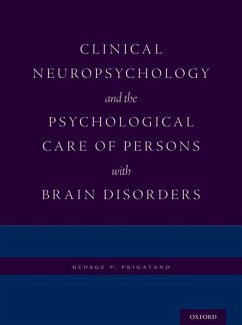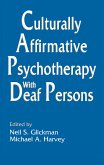George P Prigatano
Clinical Neuropsychology and the Psychological Care of Persons with Brain Disorders
George P Prigatano
Clinical Neuropsychology and the Psychological Care of Persons with Brain Disorders
- Gebundenes Buch
- Merkliste
- Auf die Merkliste
- Bewerten Bewerten
- Teilen
- Produkt teilen
- Produkterinnerung
- Produkterinnerung
Clinical Neuropsychology and the Psychological Care of Persons with Brain Disorders is written for individuals seeking to improve psychological care services for persons with a brain disorder. It provides background information regarding the normal development and decline of brain functions and how various brain disorders impact neuropsychological functioning. It then provides examples of how to improve the psychological care of individuals with variousbrain disorders (e.g. traumatic brain injury, cerebral anoxia, multiple sclerosis, cerebral vascular accidents, Parkinson's disease, and various dementias).…mehr
Andere Kunden interessierten sich auch für
![Working with the Brain in Psychology Working with the Brain in Psychology]() Lynn A SchaeferWorking with the Brain in Psychology175,99 €
Lynn A SchaeferWorking with the Brain in Psychology175,99 €![Introduction to Neuropsychology Introduction to Neuropsychology]() J Graham BeaumontIntroduction to Neuropsychology82,99 €
J Graham BeaumontIntroduction to Neuropsychology82,99 €![Culturally Affirmative Psychotherapy with Deaf Persons Culturally Affirmative Psychotherapy with Deaf Persons]() Culturally Affirmative Psychotherapy with Deaf Persons186,99 €
Culturally Affirmative Psychotherapy with Deaf Persons186,99 €![Extreme Fear, Shyness, and Social Phobia Extreme Fear, Shyness, and Social Phobia]() Louis A SchmidtExtreme Fear, Shyness, and Social Phobia96,99 €
Louis A SchmidtExtreme Fear, Shyness, and Social Phobia96,99 €![Practitioner's Guide to Symptom Base Rates in the General Population Practitioner's Guide to Symptom Base Rates in the General Population]() Robert J. McCaffrey / Lyndsey Bauer / Anjali A. Palav / Sid E. O'Bryant (eds.)Practitioner's Guide to Symptom Base Rates in the General Population66,99 €
Robert J. McCaffrey / Lyndsey Bauer / Anjali A. Palav / Sid E. O'Bryant (eds.)Practitioner's Guide to Symptom Base Rates in the General Population66,99 €![Clinical Neuropsychology and Cost Outcome Research Clinical Neuropsychology and Cost Outcome Research]() Neil Pliskin / George Prigatano (eds.)Clinical Neuropsychology and Cost Outcome Research187,99 €
Neil Pliskin / George Prigatano (eds.)Clinical Neuropsychology and Cost Outcome Research187,99 €![The Oxford Handbook of Traumatic Stress Disorders The Oxford Handbook of Traumatic Stress Disorders]() The Oxford Handbook of Traumatic Stress Disorders171,99 €
The Oxford Handbook of Traumatic Stress Disorders171,99 €-
-
-
Clinical Neuropsychology and the Psychological Care of Persons with Brain Disorders is written for individuals seeking to improve psychological care services for persons with a brain disorder. It provides background information regarding the normal development and decline of brain functions and how various brain disorders impact neuropsychological functioning. It then provides examples of how to improve the psychological care of individuals with variousbrain disorders (e.g. traumatic brain injury, cerebral anoxia, multiple sclerosis, cerebral vascular accidents, Parkinson's disease, and various dementias).
Hinweis: Dieser Artikel kann nur an eine deutsche Lieferadresse ausgeliefert werden.
Hinweis: Dieser Artikel kann nur an eine deutsche Lieferadresse ausgeliefert werden.
Produktdetails
- Produktdetails
- Verlag: Hurst & Co.
- Seitenzahl: 536
- Erscheinungstermin: 8. Oktober 2019
- Englisch
- Abmessung: 256mm x 186mm x 47mm
- Gewicht: 1110g
- ISBN-13: 9780190645939
- ISBN-10: 0190645938
- Artikelnr.: 57060975
- Herstellerkennzeichnung
- Libri GmbH
- Europaallee 1
- 36244 Bad Hersfeld
- gpsr@libri.de
- Verlag: Hurst & Co.
- Seitenzahl: 536
- Erscheinungstermin: 8. Oktober 2019
- Englisch
- Abmessung: 256mm x 186mm x 47mm
- Gewicht: 1110g
- ISBN-13: 9780190645939
- ISBN-10: 0190645938
- Artikelnr.: 57060975
- Herstellerkennzeichnung
- Libri GmbH
- Europaallee 1
- 36244 Bad Hersfeld
- gpsr@libri.de
Dr. Prigatano is presently the Emeritus Chairman of Clinical Neuropsychology and Newsome Chair of Neuropsychology at the Barrow Neurological Institute in Phoenix, Arizona. He is an internationally recognized expert in neuropsychological rehabilitation and the study of anosognosia. His most recent professional work focuses both on the neuropsychological assessment and psychotherapy of children and adults with various brain disorders. He is an honorary member of several international organizations and in 1998 served as the President of the National Academy of Neuropsychology within the United States.
* Preface
* Dedication
* Chapter 1. Introduction to Psychological Care of Persons with a Brain
Disorder with the Practice of Clinical Neuropsychology
* Part I Brief Description of Normal Neuropsychological Functioning
over the Lifespan
* Chapter 2. Human Nature in Light of the Natural Plan of the Central
Nervous System
* Chapter 3. The Evolution of Normal Brain-Behavior Relationships
* Chapter 4. Neuropsychological and Psychosocial Competencies
throughout the life Span
* Chapter 5. Conscious and Unconscious Manifestations of Underlying
Higher Integrative Brain Functions
* Part II Brief Description of Abnormal Neuropsychological Functioning
over the Lifespan
* Chapter 6. The Problem of Not Developing Normally after a Brain
Disorder during Childhood and Adolescence
* Chapter 7. The Problem of Lost Normality after a Brain Disorder
during Adulthood
* Chapter 8. The Problem of Unexpected and Accelerated Loss of
Competency after a Brain Disorder during Aging
* Chapter 9. Disturbances of Self-Awareness Related to Brain
Dysfunction versus Psychological Distress: a Phenomenological
Approach
* Part III Assessment, Education and Treatments: Core features of
Psychological Care of Persons with a Brain Disorder
* Chapter 10. A Medically Necessary and Personally Relevant
Neuropsychological Consultation and Examination
* Chapter 11. Neuropsychological Consultations Before and After
Neurosurgery
* Chapter 12. The Multifaceted Nature of Psychological Treatments.
* Part IV Clinical Applications
* Chapter 13. Psychological Care of Persons with Cerebral Anoxia
Secondary to Cardiac Arrest
* Chapter 14. Psychological Care of Persons with Parkinson's disease
* Chapter 15. Psychological Care of Persons with Multiple Sclerosis
* Chapter 16. Psychological Care of Persons with Malignant Brain Tumors
* Chapter 17. Psychological Care of Persons with a History of
Aneurysmal Subarachnoid Hemorrhage
* Chapter 18. Psychological Care of Persons with Aphasia secondary to a
Cerebral Vascular Accident or Traumatic Brain Injury
* Chapter 19. Psychological Care of Persons with Hemiplegia/Hemiparesis
secondary to a Cerebral Vascular Accident or Traumatic Brain Injury
* Chapter 20. Psychological Care of Persons with Early stage Dementia
* Chapter 21. Psychological Care of Persons with Cognitive and
Behavioral Disorders secondary to Traumatic Brain Injury
* Chapter 22. Psychological Care of Children with Known or Suspected
Acquired Brain Disorders
* Chapter 23. Psychological Care of Persons with both Epileptic and
Non-epileptic (Psychogenic) Seizures
* Chapter 24. Psychological Care of Persons with Psychiatric Based
Cognitive Complaints
* Part V Postscript
* Chapter 25. Synthesis and Postscript
* Dedication
* Chapter 1. Introduction to Psychological Care of Persons with a Brain
Disorder with the Practice of Clinical Neuropsychology
* Part I Brief Description of Normal Neuropsychological Functioning
over the Lifespan
* Chapter 2. Human Nature in Light of the Natural Plan of the Central
Nervous System
* Chapter 3. The Evolution of Normal Brain-Behavior Relationships
* Chapter 4. Neuropsychological and Psychosocial Competencies
throughout the life Span
* Chapter 5. Conscious and Unconscious Manifestations of Underlying
Higher Integrative Brain Functions
* Part II Brief Description of Abnormal Neuropsychological Functioning
over the Lifespan
* Chapter 6. The Problem of Not Developing Normally after a Brain
Disorder during Childhood and Adolescence
* Chapter 7. The Problem of Lost Normality after a Brain Disorder
during Adulthood
* Chapter 8. The Problem of Unexpected and Accelerated Loss of
Competency after a Brain Disorder during Aging
* Chapter 9. Disturbances of Self-Awareness Related to Brain
Dysfunction versus Psychological Distress: a Phenomenological
Approach
* Part III Assessment, Education and Treatments: Core features of
Psychological Care of Persons with a Brain Disorder
* Chapter 10. A Medically Necessary and Personally Relevant
Neuropsychological Consultation and Examination
* Chapter 11. Neuropsychological Consultations Before and After
Neurosurgery
* Chapter 12. The Multifaceted Nature of Psychological Treatments.
* Part IV Clinical Applications
* Chapter 13. Psychological Care of Persons with Cerebral Anoxia
Secondary to Cardiac Arrest
* Chapter 14. Psychological Care of Persons with Parkinson's disease
* Chapter 15. Psychological Care of Persons with Multiple Sclerosis
* Chapter 16. Psychological Care of Persons with Malignant Brain Tumors
* Chapter 17. Psychological Care of Persons with a History of
Aneurysmal Subarachnoid Hemorrhage
* Chapter 18. Psychological Care of Persons with Aphasia secondary to a
Cerebral Vascular Accident or Traumatic Brain Injury
* Chapter 19. Psychological Care of Persons with Hemiplegia/Hemiparesis
secondary to a Cerebral Vascular Accident or Traumatic Brain Injury
* Chapter 20. Psychological Care of Persons with Early stage Dementia
* Chapter 21. Psychological Care of Persons with Cognitive and
Behavioral Disorders secondary to Traumatic Brain Injury
* Chapter 22. Psychological Care of Children with Known or Suspected
Acquired Brain Disorders
* Chapter 23. Psychological Care of Persons with both Epileptic and
Non-epileptic (Psychogenic) Seizures
* Chapter 24. Psychological Care of Persons with Psychiatric Based
Cognitive Complaints
* Part V Postscript
* Chapter 25. Synthesis and Postscript
* Preface
* Dedication
* Chapter 1. Introduction to Psychological Care of Persons with a Brain
Disorder with the Practice of Clinical Neuropsychology
* Part I Brief Description of Normal Neuropsychological Functioning
over the Lifespan
* Chapter 2. Human Nature in Light of the Natural Plan of the Central
Nervous System
* Chapter 3. The Evolution of Normal Brain-Behavior Relationships
* Chapter 4. Neuropsychological and Psychosocial Competencies
throughout the life Span
* Chapter 5. Conscious and Unconscious Manifestations of Underlying
Higher Integrative Brain Functions
* Part II Brief Description of Abnormal Neuropsychological Functioning
over the Lifespan
* Chapter 6. The Problem of Not Developing Normally after a Brain
Disorder during Childhood and Adolescence
* Chapter 7. The Problem of Lost Normality after a Brain Disorder
during Adulthood
* Chapter 8. The Problem of Unexpected and Accelerated Loss of
Competency after a Brain Disorder during Aging
* Chapter 9. Disturbances of Self-Awareness Related to Brain
Dysfunction versus Psychological Distress: a Phenomenological
Approach
* Part III Assessment, Education and Treatments: Core features of
Psychological Care of Persons with a Brain Disorder
* Chapter 10. A Medically Necessary and Personally Relevant
Neuropsychological Consultation and Examination
* Chapter 11. Neuropsychological Consultations Before and After
Neurosurgery
* Chapter 12. The Multifaceted Nature of Psychological Treatments.
* Part IV Clinical Applications
* Chapter 13. Psychological Care of Persons with Cerebral Anoxia
Secondary to Cardiac Arrest
* Chapter 14. Psychological Care of Persons with Parkinson's disease
* Chapter 15. Psychological Care of Persons with Multiple Sclerosis
* Chapter 16. Psychological Care of Persons with Malignant Brain Tumors
* Chapter 17. Psychological Care of Persons with a History of
Aneurysmal Subarachnoid Hemorrhage
* Chapter 18. Psychological Care of Persons with Aphasia secondary to a
Cerebral Vascular Accident or Traumatic Brain Injury
* Chapter 19. Psychological Care of Persons with Hemiplegia/Hemiparesis
secondary to a Cerebral Vascular Accident or Traumatic Brain Injury
* Chapter 20. Psychological Care of Persons with Early stage Dementia
* Chapter 21. Psychological Care of Persons with Cognitive and
Behavioral Disorders secondary to Traumatic Brain Injury
* Chapter 22. Psychological Care of Children with Known or Suspected
Acquired Brain Disorders
* Chapter 23. Psychological Care of Persons with both Epileptic and
Non-epileptic (Psychogenic) Seizures
* Chapter 24. Psychological Care of Persons with Psychiatric Based
Cognitive Complaints
* Part V Postscript
* Chapter 25. Synthesis and Postscript
* Dedication
* Chapter 1. Introduction to Psychological Care of Persons with a Brain
Disorder with the Practice of Clinical Neuropsychology
* Part I Brief Description of Normal Neuropsychological Functioning
over the Lifespan
* Chapter 2. Human Nature in Light of the Natural Plan of the Central
Nervous System
* Chapter 3. The Evolution of Normal Brain-Behavior Relationships
* Chapter 4. Neuropsychological and Psychosocial Competencies
throughout the life Span
* Chapter 5. Conscious and Unconscious Manifestations of Underlying
Higher Integrative Brain Functions
* Part II Brief Description of Abnormal Neuropsychological Functioning
over the Lifespan
* Chapter 6. The Problem of Not Developing Normally after a Brain
Disorder during Childhood and Adolescence
* Chapter 7. The Problem of Lost Normality after a Brain Disorder
during Adulthood
* Chapter 8. The Problem of Unexpected and Accelerated Loss of
Competency after a Brain Disorder during Aging
* Chapter 9. Disturbances of Self-Awareness Related to Brain
Dysfunction versus Psychological Distress: a Phenomenological
Approach
* Part III Assessment, Education and Treatments: Core features of
Psychological Care of Persons with a Brain Disorder
* Chapter 10. A Medically Necessary and Personally Relevant
Neuropsychological Consultation and Examination
* Chapter 11. Neuropsychological Consultations Before and After
Neurosurgery
* Chapter 12. The Multifaceted Nature of Psychological Treatments.
* Part IV Clinical Applications
* Chapter 13. Psychological Care of Persons with Cerebral Anoxia
Secondary to Cardiac Arrest
* Chapter 14. Psychological Care of Persons with Parkinson's disease
* Chapter 15. Psychological Care of Persons with Multiple Sclerosis
* Chapter 16. Psychological Care of Persons with Malignant Brain Tumors
* Chapter 17. Psychological Care of Persons with a History of
Aneurysmal Subarachnoid Hemorrhage
* Chapter 18. Psychological Care of Persons with Aphasia secondary to a
Cerebral Vascular Accident or Traumatic Brain Injury
* Chapter 19. Psychological Care of Persons with Hemiplegia/Hemiparesis
secondary to a Cerebral Vascular Accident or Traumatic Brain Injury
* Chapter 20. Psychological Care of Persons with Early stage Dementia
* Chapter 21. Psychological Care of Persons with Cognitive and
Behavioral Disorders secondary to Traumatic Brain Injury
* Chapter 22. Psychological Care of Children with Known or Suspected
Acquired Brain Disorders
* Chapter 23. Psychological Care of Persons with both Epileptic and
Non-epileptic (Psychogenic) Seizures
* Chapter 24. Psychological Care of Persons with Psychiatric Based
Cognitive Complaints
* Part V Postscript
* Chapter 25. Synthesis and Postscript








